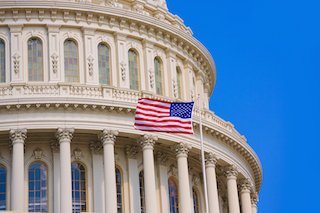A new study from the Employee Benefit Research Institute (EBRI) finds expanding retirement plan eligibility by requiring a plan for all employers except those with fewer than 10 employees would make a substantial impact on employees ages 35–39.
The study, “Under the Dome – A Closer Look at Legislative Proposals Impacting Retirement,” examines important elements of several legislative proposals, including ones geared to improve coverage, reduce plan leakage, increase utilization of guaranteed income for life solutions, and delay and/or reduce required minimum distributions.
EBRI found that all would have net positive effects on retirement savings, coverage and income for employees and retirees.
The Issue Brief considers requiring retirement plans for most full- and part-time workers at all but the smallest employers, auto portability, providing the option of guaranteed income for life from 401(k) and 403(b) plans, allowing open multiple employer plans (MEPs) and modifying required minimum distributions (RMDs).
Under the current system, EBRI projects that workers ages 35–39 will experience an average retirement deficit of $49,182. However, under a system that includes plans for all employers with at least 10 employees and all new plans are assumed to be auto-IRAs, retirement deficits for workers ages 35–39 decrease by 15.2%.
Were the auto-escalation cap for the auto-IRAs to be raised from 10% to 15%, the average retirement deficits are simulated to decrease by 17%. If, in addition to these provisions, all non-excludable employees are covered by the plan, the average retirement deficit for this cohort is simulated to decrease by 17.3%.
EBRI also examined the impact of auto portability, whereby — upon employment termination — all defined contribution (DC) assets are temporarily held in a clearinghouse and then automatically combined with workers’ active DC accounts in a new employer’s plan. If a full auto portability scenario is assumed on top of all of the aforementioned changes to the retirement system, the average retirement deficit is simulated to decrease by 27.1%.
Additional findings
- There is an overall positive impact in using half of 401(k) or 403(b) balances at age 65 to purchase an immediate annuity. The results vary with the simulated date of death, but overall, a single premium immediate annuity purchase amounting to 50% of 401(k) or 403(b) balances at age 65 would decrease average retirement deficits by $985.
- Open MEPs would result in a significant reduction in retirement deficits for those who would have spent a considerable portion of their work career without eligibility for an employer sponsored retirement plan. Employees with the least amount of years of eligibility for an employer-sponsored retirement plan are projected to experience average reductions in their retirement deficits of 26.7%.
- The one-time impact on individual retirement account (IRA) distributions for those ages 71 to 100 under several combinations of increases in RMD life expectancy and/or increases in the start date of RMDs ranged from as small as 0.2% to as much as 8.4%.
“By quantifying the impact of potential legislative changes to the nation’s retirement system, EBRI allows plan sponsors, providers, and policymakers to better understand their ramifications,” said Jack VanDerhei, EBRI director of research and author of this study. “This, in turn, can lead to better decision-making on the issues that will impact the lives of millions of American workers.”
The EBRI Retirement Security Projection Model (RSPM) was developed in 2003 to provide an assessment of national retirement income adequacy. It is able to project retirement deficits by various age, income, gender, and marital status cohorts. It is flexible enough to examine potential changes to the system, such as the impact of legislative and regulatory proposals as well as changes in retirement plan design. RSPM provides valuable analysis for employers, providers, and policymakers as they seek to understand the drivers of retirement security and the possible outlooks for various cohorts over time. Copies of the report are available at ebri.org.
About EBRI: The Employee Benefit Research Institute is a private, nonpartisan, nonprofit research institute based in Washington, DC, that focuses on health, savings, retirement, and financial security issues. EBRI does not lobby and does not take policy positions. The work of EBRI is made possible by funding from its members and sponsors, who include a broad range of public, private, for-profit and nonprofit organizations. For more information go to www.ebri.org












